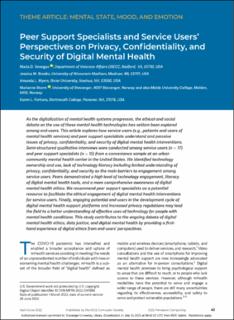| dc.contributor.author | Venegas, Maria D. | |
| dc.contributor.author | Brooks, Jessica M. | |
| dc.contributor.author | Myers, Amanda L. | |
| dc.contributor.author | Storm, Marianne | |
| dc.contributor.author | Fortuna, Karen L. | |
| dc.coverage.spatial | USA | en_US |
| dc.date.accessioned | 2022-09-01T12:08:25Z | |
| dc.date.available | 2022-09-01T12:08:25Z | |
| dc.date.created | 2022-01-10T09:22:42Z | |
| dc.date.issued | 2022 | |
| dc.identifier.citation | Peer Support Specialists and Service Users’ Perspectives on privacy, confidentiality, and security of digital mental health. IEEE pervasive computing. 2022, . | en_US |
| dc.identifier.issn | 1536-1268 | |
| dc.identifier.uri | https://hdl.handle.net/11250/3015152 | |
| dc.description.abstract | As the digitalization of mental health systems progresses, the ethical and social debate on the use of these mental health technologies has seldom been explored among end-users. This article explores how service users (e.g., patients and users of mental health services) and peer support specialists understand and perceive issues of privacy, confidentiality, and security of digital mental health interventions. Semi-structured qualitative interviews were conducted among service users (n = 17) and peer support specialists (n = 15) from a convenience sample at an urban community mental health center in the United States. We identified technology ownership and use, lack of technology literacy including limited understanding of privacy, confidentiality, and security as the main barriers to engagement among service users. Peers demonstrated a high level of technology engagement, literacy of digital mental health tools, and a more comprehensive awareness of digital mental health ethics. We recommend peer support specialists as a potential resource to facilitate the ethical engagement of digital mental health interventions for service users. Finally, engaging potential end-users in the development cycle of digital mental health support platforms and increased privacy regulations may lead the field to a better understanding of effective uses of technology for people with mental health conditions. This study contributes to the ongoing debate of digital mental health ethics, data justice, and digital mental health by providing a first-hand experience of digital ethics from end-users’ perspectives. | en_US |
| dc.language.iso | eng | en_US |
| dc.publisher | IEEE | en_US |
| dc.subject | digitalisering | en_US |
| dc.subject | helsedata | en_US |
| dc.subject | datasikkerhet | en_US |
| dc.subject | mental helse | en_US |
| dc.subject | psykisk helse | en_US |
| dc.subject | sensitive data | en_US |
| dc.title | Peer Support Specialists and Service Users’ Perspectives on privacy, confidentiality, and security of digital mental health | en_US |
| dc.type | Peer reviewed | en_US |
| dc.type | Journal article | en_US |
| dc.description.version | publishedVersion | en_US |
| dc.subject.nsi | VDP::Teknologi: 500::Informasjons- og kommunikasjonsteknologi: 550 | en_US |
| dc.source.pagenumber | 10 | en_US |
| dc.source.journal | IEEE pervasive computing | en_US |
| dc.identifier.doi | 10.1109/MPRV.2022.3141986 | |
| dc.identifier.cristin | 1977173 | |
| cristin.ispublished | true | |
| cristin.fulltext | original | |
| cristin.qualitycode | 2 | |
